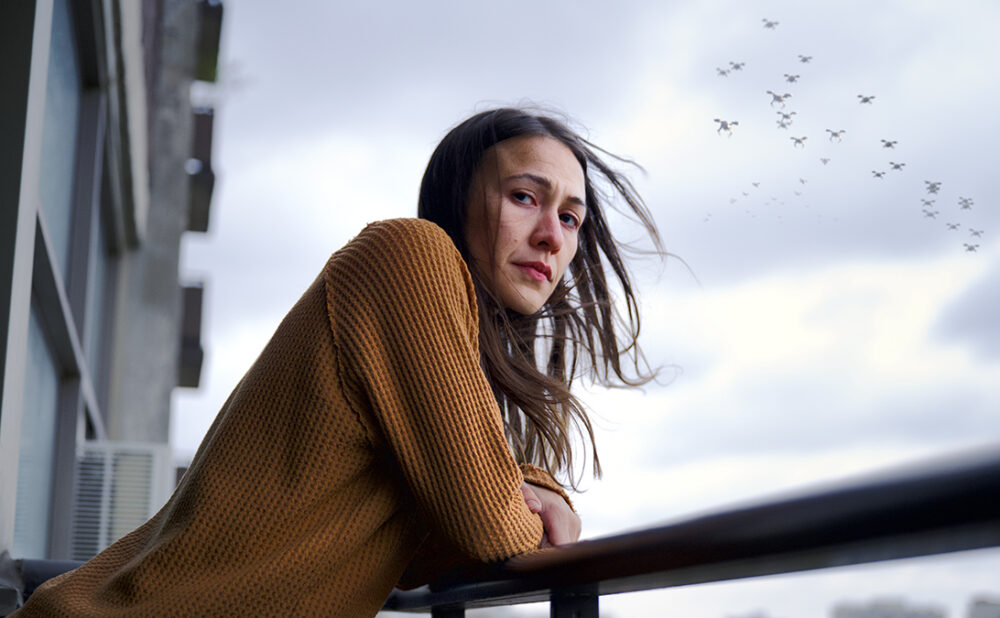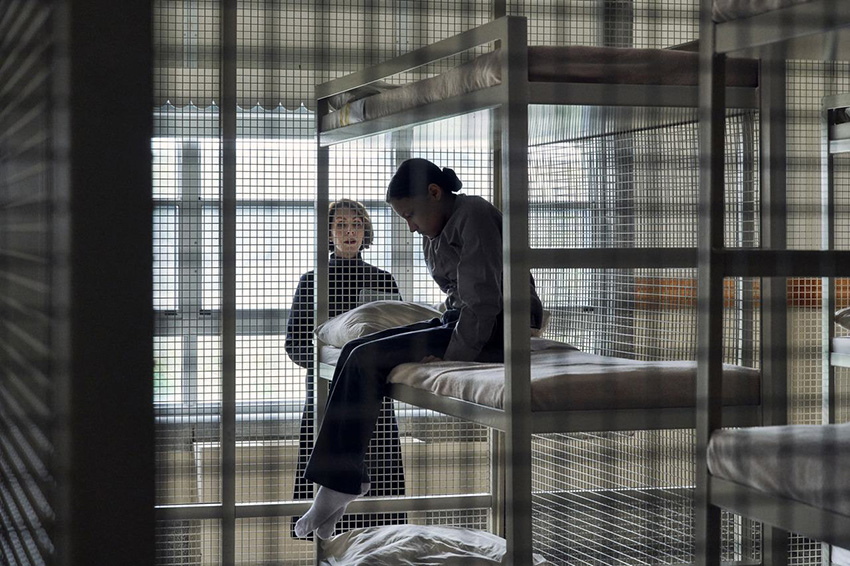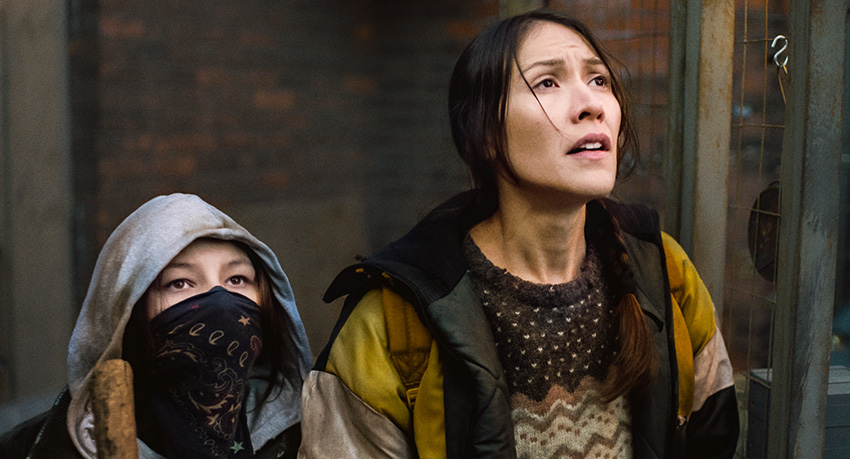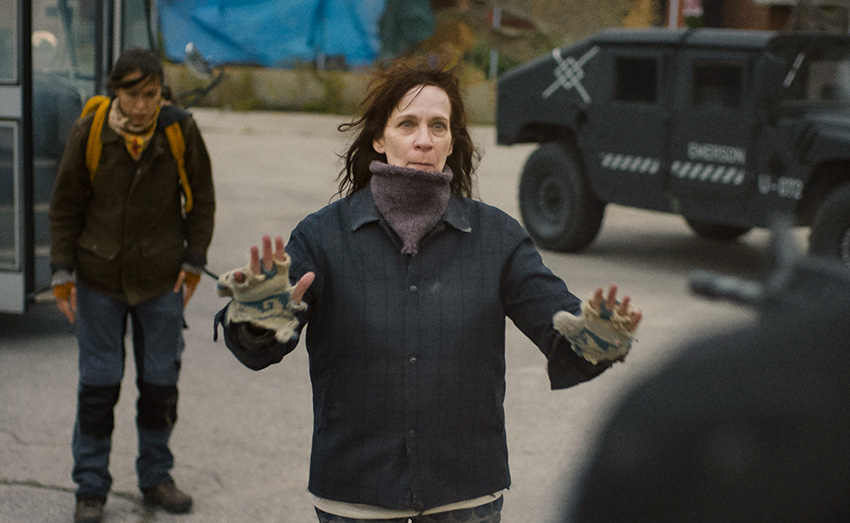Night Raiders Delivers Indigenous Resistance in Sci-Fi Sensation
Get transported to a dystopian, post-war North America.

The morning after the Canadian premiere of Indigenous sci-fi film Night Raiders at the Toronto International Film Festival (TIFF) is one of quiet celebration and reverence. Quiet because the downtown Toronto press office has glass walls and creaky wood floors, and no one wants to disturb lead star Elle-Máijá Tailfeathers or writer-director Danis Goulet during their post-premiere interviews. But even in hushed tones, there’s an obvious — and justified — buzz in the air, thanks to the movie’s TIFF screening.
Not operating at full capacity this year, TIFF had to be selective with its in-person theatre offerings and clearly made the right call with Night Raiders. This Canada-New Zealand co-production has been years in the making and could not have had a more poignant release.
The film transports viewers to a dystopian, post-war North America in the year 2043. A military occupation controls the streets, and children are property of the state, raised to be obedient soldiers. Niska is a Cree woman desperately trying to keep her daughter Waseese from the government’s grips. When Niska can no longer fight alone and her child is locked in a state-run academy, she meets the Night Raiders, an underground Indigenous vigilante group taking their children back one by one.

Goulet’s decision to tell this story through a science-fiction lens was clearly freeing. At its core, science fiction is an exploration of humanity, and while it pushes the bounds of reality, often the results don’t seem too far-fetched.
Take, for example, the virus that sweeps through the community in Night Raiders — the film wrapped production in November 2019, meaning Goulet’s narrative pre-dated the COVID-19 pandemic.
And while fictional, Night Raiders is heavily influenced by real, lived experiences within Indigenous communities.
“The thing about Niska, she encompasses so many Indigenous women that I know. Her story is close to home for myself, my family and so many others,” Tailfeathers confides as she sits across from me in an office boardroom, her love for this film and Niska’s character palpable.

Celebrated for her ability to tell Indigenous stories, Tailfeathers is an award-winning Vancouver-based writer, director and actor. She’s best known for her directorial role on the emotional drama, The Body Remembers When the World Broke Open, as well as starring in the zombie horror flick, Blood Quantum.
“Niska is someone who has experienced violence, the most recent is having her child taken away from her. Generations of our people have taken on that type of violence. Niska’s a person who’s experienced immense pain and immeasurable barriers and is somehow still finding the strength and capacity to love and move forward. I think there’s so much power in showing that particular experience on screen.”

In spite of its heavy subject matter, there’s a great sense of love, community and hope throughout the film. There’s a mother-daughter bond that can’t be broken and a lesson in allowing yourself to accept help from others.
This love was also felt off-camera.
“It was one of the best experiences I’ve ever had on set!” Tailfeathers gushes. “There were a ton of Māori people from New Zealand and Indigenous people from all over North America, not just cast but crew. There were Elders, ceremonies, spaces for cultural safety and support. It was so much fun to come to work every single day. I think that’s reflective of being in Indigenous spaces — there’s always laughter, always joy.”
Tailfeathers credits Goulet as a long-time inspiration and mentor and was overwhelmed by the opportunity to work alongside her. She’s quick to celebrate Goulet’s advocacy work for Indigenous representation within Canada’s art spaces.
“I learned so much, both as an actor and a filmmaker, by watching some of the fearless decisions Danis made. I’ve been on sets with big egos, but Danis embodies compassion, strength and vulnerability. It was incredible to watch her process and know that you can achieve greatness while remaining rooted in your humanity and empathy.”
Tailfeathers describes the current rise of Indigenous film and television as “a dream” (see EMA Films’ Beans or FX’s Reservation Dogs) and thinks there’s a lot viewers can take away from Night Raiders.
“I hope that Indigenous audiences walk away feeling loved, seen, heard and understood. I hope Indigenous youth walk away feeling like our people are superheroes and that we’re worthy of celebration.
“And I hope that non-Indigenous audiences walk away with a respect for who we are, our stories and our strength. I hope they also understand there’s so much work to do in this country and that the violence we faced in residential schools is still alive in other capacities. There’s still a lot to learn and unlearn.”








